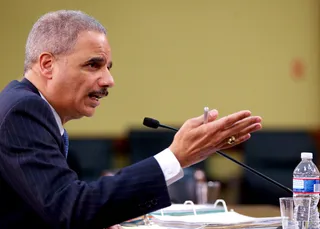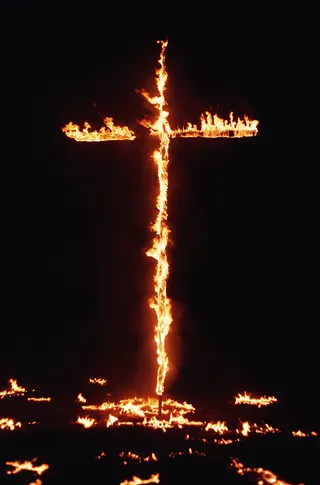Uncovering Hate Crimes in America
How the FBI is combats hate crimes nationally.

1 / 12
Combatting Hate Crimes - Attorney General Eric Holder said the U.S. Justice Department is continuing its investigation into whether civil or hate crime charges will be brought against George Zimmerman, who was acquitted of fatally shooting Trayvon Martin, an unarmed Black teen, last February. Keep reading for a closer look at how federal law defines hate crimes and steps the department has taken to combat them. — Britt Middleton (Photo: Molly Riley/AP Photo, File)
Photo By Molly Riley/AP Photo

2 / 12
How Is a Hate Crime Defined? - Congress has defined a hate crime as a "criminal offense against a person or property motivated in whole or in part by an offender’s bias against a race, religion, disability, ethnic origin or sexual orientation." The Federal Bureau of Investigation (FBI) notes that "hate itself is not a crime," and therefore is shielded as freedom of speech along with other civil liberties. (Photo: Getty Images)
Photo By T. O'Keefe/PhotoLink/Getty

3 / 12
Jurisdiction - According to the FBI, a hate crime is not a distinct federal offense. "However, the federal government can and does investigate and prosecute crimes of bias as civil rights violations, which do fall under its jurisdiction. These efforts serve as a backstop for state and local authorities, which handle the vast majority of hate crime cases," the agency writes on its website. (Photo: Express Newspapers/Getty Images)

4 / 12
2009 Law - The Matthew Shepard and James Byrd Jr. Hate Crimes Prevention Act of 2009 provides funding and technical assistance to state, local and tribal jurisdictions to help them investigate and prosecute hate crimes to the fullest extent, including crimes directed at the gay, lesbian, bisexual and transgender community. The law was the first significant expansion of federal criminal civil rights law since the mid-1990s. (Photo: Win McNamee/Getty Images)

5 / 12
Additional Applications - The 2009 law also applies if the crime was committed "because of the actual or perceived religion, national origin, gender, sexual orientation, gender identity, or disability of any person and the crime affected interstate or foreign commerce or occurred within federal special maritime and territorial jurisdiction." (Photo: Chip Somodevilla/Getty Images)
ADVERTISEMENT

6 / 12
Matthew Shepard - The act was named for the high profile murder cases of Matthew Shepard and James Byrd Jr. In 1998, Shepard, a 21-year-old college student at the University of Wyoming, was abducted from a local bar and taken to a remote field near Laramie, Wyoming, where he was tied to a fence, tortured, pistol-whipped and left to die. During trial, prosecutors alleged the men targeted Shepard because he was gay and the men pretended to be gay so they could gain Shepard's trust and rob him. Shepard's killers, Aaron McKinney and Russell Henderson, are both serving two consecutive life sentences. (Photo: Gary Caskey / Reuters)

7 / 12
James Byrd Jr. - In what was called one of the most notorious hate crimes of modern times, James Byrd Jr., 49, was murdered by three white supremacists in Jasper, Texas, in 1998. Offering Byrd a ride home, the men instead drove to a remote country road, beat him, chained his legs to the back of their pick-up truck and dragged him for several miles. In the attack, Byrd’s head and arm had been ripped off, and the men dumped his body on the roadway. Following Byrd's murder, Texas Gov. Rick Perry signed into law the James Byrd Jr. Hate Crimes Act, strengthening punishments for hate crimes in the state. (Photo: Reuters /Landov)

8 / 12
The FBI's Role - The FBI says it takes a number of steps to combat hate crimes, including serving as the sole investigative force for criminal violations of federal civil rights statutes, placing a focus on racially-motivated killings from the civil rights era, partnering with civil rights groups and assisting state and local authorities on open investigations. (Photo: United States Government)

9 / 12
Further Classification of Investigations - Hate crimes directed at the U.S. government or the American public may be investigated as acts of domestic terrorism. Incidents involving hate groups are also investigated as domestic terrorism. (Photo: Spencer Platt/Getty Images)

10 / 12
How Hate Crimes are Investigated and Prosecuted - After an allegation is reported from a reliable source, the FBI initiates a hate crime investigation. According to the agency, most complaints are received from the victim, a witness or a third party. Many cases are also initiated by media reports, community group complaints, referrals from Department of Justice or U.S. Attorneys, and congressional inquiries. (Photo: Mark Wilson/Getty Images)
ADVERTISEMENT

11 / 12
Prosecution at the Local and Federal Level - The Fifth Amendment of the United States Constitution protects individuals from double jeopardy (being tried twice for the same crime or multiple punishment in the same indictment). However, a defendant in an alleged hate crime case can be charged by their local court as well as prosecuted under federal law. This is because the two governments (local/state and federal) are considered to be different sovereigns in the eyes of the law, according to the Southern Poverty Law Center. (Photo: Cristian Baitg/ Getty Images)
